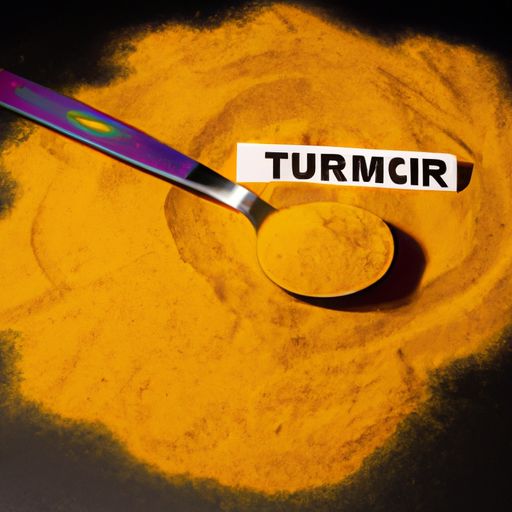If you’re anything like me, you’ve likely heard about the numerous health advantages of turmeric. From decreasing inflammation to reducing the chances of chronic illnesses, turmeric has gained popularity as a spice in the health and wellness world. Yet, a common query is whether consuming a tablespoon of turmeric is excessive.
I understand the concern. After all, too much of anything can be harmful. But before we dismiss turmeric altogether, let’s explore the origins and uses of this spice, understand its active ingredient, and delve into the potential health benefits and risks associated with consuming too much turmeric.
By the end of this article, you’ll have a better understanding of how much turmeric you should consume and the factors that affect safe consumption levels.
So, let’s get started.
Key Takeaways
- Turmeric has been used for medicinal purposes for over 4,000 years and contains the active ingredient curcumin, which has antioxidant, anti-inflammatory, and anti-cancer properties.
- While turmeric can be beneficial, it has low bioavailability and should be consumed with black pepper or a fat source to increase absorption. High doses can have potential side effects, so moderation is key.
- Turmeric has cancer-fighting properties and can increase levels of brain-derived neurotrophic factor (BDNF). However, the amount of curcumin in turmeric is relatively low, and safe consumption levels vary depending on factors such as age, weight, and overall health.
- Turmeric may interact with certain medications and can cause possible side effects. It should not be used as a substitute for medical treatment, but can provide additional health benefits when used in conjunction with traditional medicine. Individuals taking prescription medications should consult with their healthcare provider before consuming turmeric, and dosage guidelines for specific health conditions should be discussed with a healthcare practitioner.
The Origins and Uses of Turmeric
You may be surprised to learn that turmeric has been used for medicinal purposes for over 4,000 years and was even mentioned in ancient Ayurvedic texts. Its origins can be traced back to Southern India and it was later introduced to Southeast Asia, where it became a staple in traditional medicine.
Turmeric is a member of the ginger family and is known for its bright yellow color and distinctive flavor. Aside from its use as a spice in cooking, turmeric has a long history of medicinal properties. It has been used to treat a range of ailments, including digestive issues, inflammation, and even cancer.
Its active ingredient, curcumin, has been extensively studied and has been found to have antioxidant, anti-inflammatory, and anti-cancer properties. Understanding the active ingredient in turmeric is key to understanding its potential health benefits.
Understanding the Active Ingredient in Turmeric
Let’s explore what makes turmeric such a powerful spice and how it can benefit our health.
One of the key components in turmeric is curcumin, which is responsible for its vibrant yellow color and many of its health benefits. However, curcumin has low bioavailability, meaning that it’s not easily absorbed by the body.
In order to increase its bioavailability, it’s recommended to consume turmeric with black pepper or a fat source, such as coconut oil. Consuming high doses of turmeric can also have potential side effects, such as digestive issues and an increased risk of bleeding.
It’s important to follow recommended dosage guidelines and consult with a healthcare professional before taking turmeric supplements. With an understanding of turmeric’s bioavailability and potential side effects, we can now delve into the potential health benefits of this powerful spice.
Potential Health Benefits of Turmeric
As I delve deeper into the topic of turmeric, I can’t help but be amazed by its potential health benefits. Its anti-inflammatory properties have been proven to be effective in reducing inflammation and pain in the body. This makes it a promising natural remedy for conditions such as arthritis.
It’s also a powerful antioxidant, which helps protect the body against damage caused by free radicals. Studies have suggested that turmeric may be helpful in preventing certain types of cancer and improving brain function.
Anti-inflammatory properties
Did you know that turmeric has anti-inflammatory properties due to its compound curcumin? Curcumin has been shown to be as effective as some anti-inflammatory drugs, as it blocks the activity of enzymes that cause inflammation in the body. Chronic inflammation has been linked to many diseases such as heart disease, cancer, Alzheimer’s, and arthritis. Turmeric supplements, which contain concentrated amounts of curcumin, have become increasingly popular as a natural way to combat inflammation. However, it’s important to note that dosage recommendations vary, and it’s always best to consult with a healthcare professional before starting any new supplement regimen.
In addition to its anti-inflammatory properties, turmeric possesses antioxidant properties. Antioxidants help protect the body from damage caused by free radicals, which are unstable molecules that can damage cells and contribute to the development of diseases. Turmeric’s antioxidant properties are due to the presence of curcumin, which has been shown to neutralize free radicals and stimulate the body’s own antioxidant enzymes. So, not only does turmeric help combat inflammation, but it also helps protect the body from oxidative stress.
Antioxidant properties
Turmeric’s ability to neutralize free radicals and stimulate antioxidant enzymes makes it a powerful ally in protecting the body from diseases like cancer, diabetes, and heart disease. Research has shown that turmeric has a higher antioxidant activity than vitamin E and C, which are well-known antioxidants. The antioxidant properties of turmeric are attributed to its active ingredient, curcumin, which scavenges free radicals and prevents them from causing damage to cells.
When it comes to turmeric dosage, it’s recommended to consume no more than one teaspoon per day, which is equivalent to 2000-3000 mg of curcumin. However, higher dosages have been tested in scientific studies and have shown to be safe for short-term use. It’s important to note that the benefits of turmeric are not limited to its antioxidant properties; it also possesses anti-inflammatory, anti-bacterial, and anti-viral properties, making it a versatile spice to incorporate into your diet.
The antioxidant properties of turmeric make it a valuable component in disease prevention. While the recommended daily dosage should be followed, higher dosages have been shown to be safe for short-term use.
In the next section, we’ll explore the potential cancer prevention benefits of turmeric.
Potential cancer prevention
One potential benefit of incorporating turmeric into your diet is that it may be as effective as a superhero’s shield in preventing cancer. Turmeric contains curcumin, a compound that has been shown to have cancer-fighting properties. Studies have found that curcumin can inhibit the growth and spread of cancer cells in various types of cancer, including breast, colon, and prostate cancer.
However, it’s important to note that while turmeric shows promise in preventing cancer, it’s not a cure-all and shouldn’t be used as a substitute for medical treatment. In terms of dosage recommendations, a tablespoon of turmeric may be too much for most people. It’s recommended to consume turmeric in moderation and to consult with a healthcare provider before making any significant changes to your diet.
Moving forward, let’s explore how turmeric can potentially enhance brain function.
Enhanced brain function
You can potentially boost your brain function by incorporating the powerful compound curcumin found in turmeric into your diet. Studies have shown that curcumin has the ability to increase levels of brain-derived neurotrophic factor (BDNF), which is a growth hormone that promotes the survival of neurons in the brain. This increase in BDNF has been linked to improved brain function and a reduced risk of brain diseases such as Alzheimer’s and depression.
While some people choose to take turmeric supplements to reap the benefits of curcumin, incorporating turmeric into your daily routine can be as simple as adding it to your meals or drinking it as a tea. However, it’s important to note that the amount of curcumin in turmeric is relatively low, so taking a supplement may be necessary to achieve the desired effects.
In the next section, we’ll discuss the recommended daily intake of turmeric and how to ensure you’re getting enough curcumin to see the benefits.
Recommended Daily Intake
If you want to add a pop of flavor and color to your dishes, a tablespoon of turmeric is a great addition, but don’t go overboard! The recommended daily intake of turmeric is about one teaspoon, which translates to around 2000-3000mg of curcumin, the active ingredient in turmeric responsible for its health benefits. Consuming more than this amount can lead to potential risks and adverse effects.
Benefits and risks of consuming turmeric supplements should also be taken into consideration. While turmeric supplements are often marketed as a way to improve health and prevent chronic diseases, the evidence for their effectiveness is still inconclusive. Additionally, taking high doses of turmeric supplements can lead to gastrointestinal issues, liver problems, and even kidney stones. Therefore, it’s important to consult with a healthcare professional before adding turmeric supplements to your daily routine.
Consuming too much turmeric can have potential risks, despite its many benefits.
In the next section, we’ll look at the potential risks of consuming too much turmeric and how to avoid them.
Potential Risks of Consuming Too Much Turmeric
Be cautious not to exceed the recommended daily intake of turmeric, as consuming excessive amounts can lead to potential risks and adverse effects. While turmeric has been praised for its anti-inflammatory and antioxidant properties, it’s important to consume it in moderation.
Here are some potential risks of consuming too much turmeric:
-
Turmeric can cause gastrointestinal issues such as nausea, vomiting, and diarrhea. This is especially true when taken in large doses or on an empty stomach.
-
Turmeric can interact with certain medications such as blood thinners, causing adverse effects.
-
Consuming high amounts of turmeric has been linked to liver damage in some individuals.
-
In rare cases, consuming excessive amounts of turmeric can lead to an allergic reaction.
It’s important to keep in mind these potential risks and exercise caution when consuming turmeric. In the next section, we’ll explore factors that affect safe consumption levels.
Factors that Affect Safe Consumption Levels
One interesting statistic to note is that the safe consumption level of turmeric varies depending on factors such as age, weight, and overall health. These factors affect the absorption of curcumin, the active ingredient in turmeric.
For instance, older adults may require a higher dosage to realize the benefits of turmeric due to decreased absorption in their digestive system. Similarly, individuals with a higher body mass index may need a larger serving to achieve the same effect as those with a lower BMI.
Another factor to consider is possible interactions with medications. Turmeric can interact with certain drugs, including blood thinners and diabetes medications, leading to adverse effects. Therefore, individuals taking prescription medications should consult with their healthcare provider before consuming turmeric, even in small amounts.
Understanding these factors is crucial in determining safe consumption levels for turmeric and maximizing its benefits without putting one’s health at risk.
Safe Consumption Levels for Turmeric
As I delve deeper into the topic of turmeric consumption, it’s crucial to understand the safe levels of intake to avoid any potential health risks.
According to research, the recommended daily intake of turmeric is up to 500 milligrams per day. However, dosage guidelines may vary depending on specific health conditions such as arthritis, heart disease, and cancer.
Recommended daily intake
You should aim for a daily intake of no more than a teaspoon of turmeric to reap its health benefits without going overboard. Moderation is key when it comes to consuming any spice, and turmeric is no exception. While it has numerous health benefits, consuming too much of it can lead to adverse effects.
Turmeric can be obtained from various sources such as fresh root, powdered spice, and supplements. It’s best to consume it in its natural form, such as adding it to your meals, rather than relying on supplements. When using turmeric as a spice, adding a pinch to your meals can go a long way. To fully enjoy its health benefits, it’s important to incorporate it into your daily diet in a sustainable way.
Moving on to dosage guidelines for specific health conditions, it’s important to consult with a healthcare professional before incorporating turmeric into your treatment plan.
Dosage guidelines for specific health conditions
Let’s explore the dosage guidelines for specific health conditions when incorporating turmeric into your treatment plan. It’s important to note that herbal remedies, including turmeric, shouldn’t be used as a substitute for medical treatment. However, if used in conjunction with traditional medicine, turmeric can provide additional health benefits.
For general health and well-being, a daily dose of 1-3 grams of turmeric is recommended. For specific health conditions, such as arthritis or digestive issues, higher doses may be necessary. For example, individuals with arthritis may benefit from taking 500 milligrams of turmeric extract twice daily.
It’s important to consult with a healthcare practitioner before incorporating turmeric into your treatment plan to ensure proper dosage recommendations and to avoid any potential interactions with other medications.
Moving forward, let’s discuss alternative ways to consume turmeric.
Alternative Ways to Consume Turmeric
I’ve been researching alternative ways to consume turmeric and have come across a few options that I’d like to share.
One way is to simply add turmeric to your food during cooking. This can be done by adding it to soups, sauces, or even scrambled eggs for a nutritional boost.
Another option is to take turmeric supplements, which can be found in capsule or powder form.
Finally, turmeric tea is a popular choice that can be enjoyed as a hot beverage or even iced for a refreshing summer drink.
Adding turmeric to food
Adding turmeric to your meals can give them a delicious and healthy boost of flavor. Turmeric has long been used as a spice in Indian and Middle Eastern cuisine, and it’s known for its vibrant yellow color and earthy taste.
Turmeric recipes abound, from curries to roasted vegetables to turmeric-infused rice dishes. In addition to its culinary uses, turmeric also has many health benefits. It’s a natural anti-inflammatory and antioxidant, and it has been shown to have potential benefits in treating conditions such as arthritis, heart disease, and even cancer.
To get the most out of turmeric, try incorporating it into your cooking by adding it to soups, stews, and sauces. You can also sprinkle it on roasted vegetables or mix it into rice dishes for an extra burst of flavor and nutrition.
When it comes to turmeric supplements, it’s important to choose a high-quality product, and to talk to your doctor before taking any new supplements.
Turmeric supplements
Adding turmeric to food is a great way to incorporate this spice into your diet. It can add a unique flavor and color to your dishes while providing potential health benefits. However, if you’re looking to take a more concentrated dose of turmeric, you may want to consider turmeric supplements.
There are many turmeric supplement brands available on the market, but it’s important to do your research and choose a reputable one. The dosage recommendations for turmeric supplements vary depending on the brand and the specific product, so it’s important to read the label carefully and follow the instructions. It’s also a good idea to talk to your healthcare provider before starting any new supplements to ensure they’re safe for you to take.
| Pros | Cons |
|---|---|
| May reduce inflammation | May interact with certain medications |
| May improve brain function | May cause gastrointestinal issues |
| May reduce the risk of heart disease | May cause allergic reactions |
Turmeric supplements can be a convenient way to add more of this spice to your diet, but it’s important to use them safely and responsibly. As with any supplement, they should be used in conjunction with a healthy diet and lifestyle, not as a replacement for them. In the next section, we’ll explore another way to incorporate turmeric into your daily routine – by enjoying a cup of turmeric tea.
Turmeric tea
To experience the potential health benefits of turmeric in a warm and comforting way, why not try brewing yourself a cup of turmeric tea? It’s a simple and delicious way to incorporate this spice into your daily routine, and the anti-inflammatory properties of turmeric may help to soothe any aches or pains you may be experiencing.
Some of the benefits of turmeric tea include improved digestion, reduced inflammation, and increased antioxidant activity in the body. There are many recipes available for making turmeric tea, but a simple one involves adding one teaspoon of ground turmeric to a cup of hot water, along with a slice of fresh ginger and a squeeze of lemon.
Allow the tea to steep for a few minutes before straining and enjoying. However, it’s important to note that turmeric may interact with certain medications and can cause possible side effects such as stomach upset or a skin rash. It’s always best to consult with a healthcare professional before adding any new supplement or food to your diet.
Precautions and Warnings
Be careful with turmeric, as it can have side effects such as stomach upset and interactions with certain medications. While turmeric is generally safe for consumption in small amounts, taking it in large doses may cause gastrointestinal problems such as stomach ache, diarrhea, and nausea. Additionally, people who are taking medications that thin the blood, lower blood sugar, or reduce stomach acid should exercise caution when using turmeric as it may interact with these drugs.
To safely incorporate turmeric into your diet, it is recommended to start with small amounts and gradually increase the dose. It is also important to consult with a healthcare professional before taking any supplements or making significant changes to your diet. If you experience any adverse reactions, such as an allergic reaction or stomach discomfort, discontinue use immediately and seek medical attention. Below is a table summarizing possible side effects and interactions with medication:
| Possible Side Effects | Interactions with Medication |
|---|---|
| Stomach upset | Blood thinners |
| Diarrhea | Blood sugar-lowering medication |
| Nausea | Stomach acid-reducing medication |
By being aware of the potential side effects and interactions with medication, individuals can safely incorporate turmeric into their diet and reap the many health benefits it offers.
Frequently Asked Questions
How does turmeric affect the taste of food?
As someone who loves experimenting with flavors, I find turmeric to be a versatile spice that adds a warm, earthy flavor to dishes. Turmeric infused recipes and adding it to drinks are popular ways to enjoy its health benefits.
Can turmeric be used topically for skin conditions?
Turmeric has been used for centuries in skin care. Its anti-inflammatory properties can help reduce redness, acne, and eczema. It can also improve skin tone and texture. Incorporating turmeric into your topical routine can have many benefits for your skin.
Does turmeric interact with any medications?
Turmeric can interact with certain medications, including blood thinners and diabetes medications. It’s important to speak with a healthcare provider before using turmeric as a supplement or in large quantities. Recommended turmeric dosage varies depending on the intended use.
Can turmeric be safely consumed during pregnancy?
Turmeric can be safely consumed during pregnancy in moderate amounts, but excessive consumption may cause complications. It may also affect fertility by decreasing sperm count. Consult with a healthcare provider before incorporating turmeric into your diet.
Is it possible to overdose on turmeric supplements?
Overdosing on turmeric supplements is possible and can lead to health risks. It is important to follow the recommended turmeric dosage on the label and consult with a healthcare provider before taking any supplements.
Conclusion
So, is a tablespoon of turmeric too much? As with most things in life, the answer isn’t a simple yes or no.
Turmeric has been used for centuries as a medicinal herb and spice, with its active ingredient, curcumin, showing potential health benefits such as reducing inflammation and improving brain function. However, consuming too much turmeric can lead to negative side effects such as stomach upset and even liver damage.
The recommended daily intake of turmeric is around 1-2 teaspoons, which is generally safe for most people. However, factors such as age, health conditions, and medication use can affect safe consumption levels.
It’s always important to consult with a healthcare professional before making any drastic changes to your diet or supplement routine.
In conclusion, while turmeric has potential health benefits, it’s important to consume it in moderation and be aware of any potential risks. Incorporating turmeric into your diet through cooking or supplements can be a great way to boost your overall health, but it’s always best to do so under the guidance of a healthcare professional.
Remember, a little bit of turmeric can go a long way in improving your health and wellbeing.










